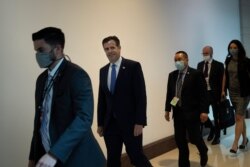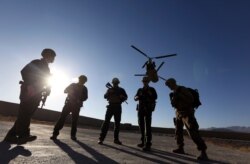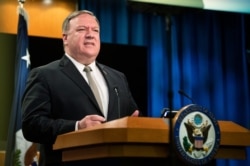Top U.S. intelligence officials briefed key members of Congress Thursday on what is known — and what is not known — about an alleged Russian plot to pay militants for attacks on American and coalition forces in Afghanistan.
CIA Director Gina Haspel and National Security Agency Director Paul Nakasone met with members of the so-called Gang of Eight.
The meeting was the first chance for lawmakers to hear directly from veteran intelligence officials about reports that Russia was offering Taliban-linked militants bounties to target and kill U.S. and allied troops.
Until now, briefings on the allegations have been led by Director of National Intelligence John Ratcliffe, a former U.S. representative who was sworn in just over a month ago, along with national security adviser Robert O’Brien and White House Chief of Staff Mark Meadows, both of whom have served in their roles less than a year.
The three have repeatedly told lawmakers that information on the alleged Russian bounty program could not be confirmed, defending the decision not to bring the intelligence to the attention of President Donald Trump.
"The person who decided early on whether the president should be briefed on this in the Oval, in the Oval intelligence briefing, was a senior career civil servant," O’Brien told White House reporters earlier on Wednesday. "And she made that decision because she didn't have confidence in the intelligence that came out."
O’Brien also said the White House was working on potential responses to Russia should additional intelligence lend credibility to the initial reports.
"These are important allegations that, if they're verified, I can guarantee you the president will take strong action” he said. “We've been working for several months on options.”
But other officials, when pressed, refused to elaborate on what might come next.
"I won't get ahead of the president on action. I also won't get ahead of the intelligence," press secretary Kayleigh McEnany said during a White House briefing, saying the intelligence remained unverified.
And Trump himself on Wednesday continued to dismiss the alleged Russian plot as a hoax, first on Twitter and later during an interview with Fox Business News.
“No corroborating evidence to back reports.” Department of Defense. Do people still not understand that this is all a made up Fake News Media Hoax started to slander me & the Republican Party. I was never briefed because any info that they may have had did not rise to that level
— Donald J. Trump (@realDonaldTrump) July 1, 2020
"We never heard about it because intelligence never found it to be of that level,” the president said.
"The intelligence people, many of them didn't believe it happened at all," he added. “I think it’s a hoax based on the newspapers and the Democrats.”
Credible reports
New media reports, however, are challenging that assertion.
The Reuters news agency, citing four U.S. and European government sources, reported Wednesday that the U.S. had acquired fresh intelligence in recent weeks that lent credibility to the claims Russia was offering Taliban-linked militants bounties to attack U.S. and coalition troops.
Current and former Taliban officials have also come forward, claiming that the bounty program was real.
“Individual commanders have been receiving money and weapons from Russian intelligence,” Moulani Baghdadi, a Taliban commander from Ghazni, told Business Insider when asked about the bounties. “These are criminal groups that work alongside the mujahedeen and give us a bad reputation.”
Mullah Manan Niazi, a onetime spokesman for former Taliban leader Mullah Omar, told The Daily Beast such a program would not be unusual.
“The Taliban have been paid by Russian intelligence for attacks on U.S. forces — and on ISIS forces ù in Afghanistan from 2014 up to the present,” he said.
U.S. defense and intelligence officials have long been concerned about Russian interference in Afghanistan, complaining repeatedly that Moscow has been providing the Taliban with weapons and training.
A new Pentagon report released Wednesday, while making no mention of the alleged bounties, warned Russian involvement is growing.
“Russia has politically supported the Taliban to cultivate influence with the group, limit the Western military presence, and encourage counter ISIS [Islamic State terror group] operations, although Russia publicly denies their involvement,” the report said.
Pompeo downplays concerns
U.S. Secretary of State Mike Pompeo on Wednesday tried to downplay concerns.
“The fact that the Russians are engaged in Afghanistan in a way that’s adverse to the United States is nothing new,” he said. “The Russians have been selling small arms that have put Americans at risk there for 10 years. We have objected to it.”
“When we see credible information that suggests that the Russians are putting American lives at risk, we’re responding in a way that is serious,” he added.
Still, Democratic lawmakers Wednesday continued to express dissatisfaction and frustration with the Trump administration’s handling of the intelligence.
“If true, these reports detail an astounding escalation by an already aggressive adversary and the President’s dereliction of his most sacred responsibility to protect the lives of the American people,” Democrats on the House Foreign Affairs Committee wrote in a letter demanding Pompeo testify before Congress.
Other Democrats were even more critical.
“If this does not count as treason, I don’t know what does,” Democratic Representative Seth Moulton said during a call with reporters Wednesday. “If the most junior officer in the United States military ignores an intelligence report delivered to him or her, as we know this intelligence report was delivered to the commander in chief, then that junior officer would absolutely be in prison.”
Not taken lightly
Despite the lack of agreement on the intelligence about the alleged Russian plot to pay Taliban-linked fighters to attack and kill U.S. and coalition forces in Afghanistan, U.S. officials insist the threat was not taken lightly, and that precautions were put in place.
And White House officials said there is no evidence any U.S. troops were harmed.
"We always act in the best interest of our troops," McEnany told reporters late Wednesday.
“The Defense Department has said they do not know of any Americans that have been killed in relation to this unverified intelligence that's currently being assessed," she added.
VOA’s Katherine Gypson and Steve Herman contributed to this story.








